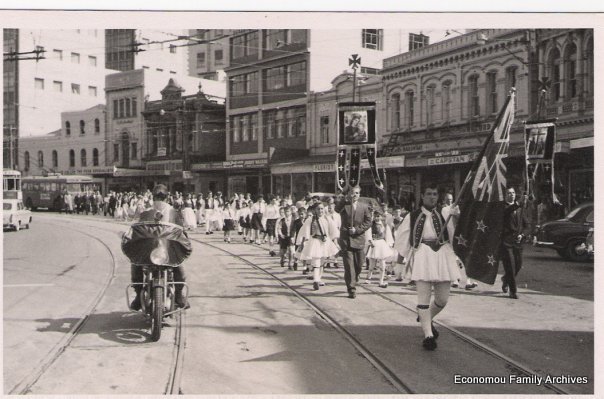“We are grateful to our esteemed Governor and precious friend
Andrew Cuomo for bringing to reality the dream we have nourished for ten
long years. St. Nicholas Church, rising again with the help of God at
Ground Zero - where it stood spiritually important for 85 years, is an
affirmation of the significance of religious freedom and experience for
all New Yorkers and all Americans. The covenant stands firm. We will
again light many candles in the new St. Nicholas Church and remember
those who were lost to us, and those heroes who so nobly sacrificed
their lives. Our pledge is to be a witness for all New Yorkers, that
freedom of conscience and the fundamental human right of free religious
expression will always shine forth in the resurrected St. Nicholas Church.”
Archbishop Demetrios, on the long awaited agreement with the Port Authority of New York and New Jersey on the rebuilding of the St Nicholas Greek Orthodox Church.
Photo by: Eric O'Connell
Photo Source: Rebuild St Nicholas at Ground Zero Facebook Page
Photo Source: Rebuild St Nicholas at Ground Zero Facebook Page
St Nicholas Greek Orthodox Church which was destroyed in the terrorist attack and subsequent collapse of the twin towers on September 11, 2001, will be rebuilt.
In New York, The Greek Orthodox Archdiocese of America announced
the much awaited and long overdue agreement with the Port Authority of New York and New Jersey
regarding the rebuilding of St. Nicholas Greek Orthodox Church, which
was destroyed in the terrorist attacks of September 11, 2001.
New York Governor Andrew Cuomo invited Archbishop Demetrios and the
Hierarchs of the Holy Eparchial Synod of the Greek Orthodox Archdiocese
of America, together with leadership of the St. Nicholas Parish and the
Archdiocesan Council to his New York City office for the official
signing of the agreement by Archdiocesan Council Vice-Chairman Michael
Jaharis and Port Authority Executive Director Chris Ward. Archbishop
Demetrios and Governor Cuomo signed as the formal witnesses to the
agreement.
Archbishop Demetrios expressed particular praise for Governor Cuomo
and also expressed deep appreciation to Michael
Jaharis and Dennis Mehiel and the other members of the joint committee
who had laboured so diligently to accomplish this historic agreement.
Governor Andrew M. Cuomo: “We lost St. Nicholas Church in the
destruction of September 11 and for too long its future has been
uncertain. Rebuilding St. Nicholas Church, with a nondenominational
bereavement center, is not just good news for the Greek Orthodox
community, but for all New Yorkers. With this agreement, we are
continuing New York’s collective healing, restoration, and resurgence.
Now we are finally returning this treasured place of reflection to where
it belongs.”
According to the Port Authority Press Release:“The agreement …
permits the rebuilding of the Church with a nondenominational
bereavement center at the east end of Liberty Park, at 130 Liberty
Street. The agreement follows a four-month independent engineering study
commissioned by the Port Authority and the Archdiocese, which found
that the Church could be built on the site with minor modifications to
the original plan and with no impact on the World Trade Center
construction schedule.”
In Washington, D.C., U.S. Reps. Gus Bilirakis (R-FL) and
Carolyn B. Maloney (D-NY), co-chairs of the Congressional Caucus on
Hellenic Issues, welcomed and applauded the agreement:
Rep. Bilirakis :“The Greek Orthodox Archdiocese has been
ready, willing, and able to re-erect its beloved church for some time
now and I am pleased that the Port Authority and New York City officials
have reached this important and symbolic agreement to reconstruct St.
Nicholas Church. As the only house of worship destroyed in the tragic
attacks on 9/11, St. Nicholas not only serves as a house of prayer and
worship for the Hellenic community, but is a reminder that the United
States and its resounding faith cannot and will not be held down by
those who wish to harm us. I look forward to the day that this church
re-opens its doors and the first post-9/11 Divine Liturgy is
celebrated,” said Rep. Bilirakis.
Rep. Maloney:“I congratulate Governor Cuomo,
Archbishop Demetrios, and Chairman Ward for their hard work to reach
this agreement. Rebuilding St. Nicholas Church, along with the major
progress underway at the World Trade Center site, will help complete our
city’s recovery from the 9/11 attacks. St. Nicholas Church has been an
important part of the Hellenic community for generations, but has also
served as a place of respite, calm, and prayer for countless others in
the lower Manhattan community. I am delighted that this iconic Church
will soon rise again,”
Greek Americans, Greek American Associations all over the USA, and all Greeks, in Greece and abroad, Global Greeks who have worked hard and unstintingly for this cause, welcomed this historic decision with a great sense of relief, joy and vindication.
We at Global Greek World, congratulate all those involved... we know that when we Greeks work together, united and determined, nothing is impossible!
Greece, the Church of Greece, the Ecumenical Patriarchate, organisations and individual people from
all over the world have sent money in support of the rebuilding.
For those that can afford to, let's
send a donation to help finance this truly worthwhile project.










